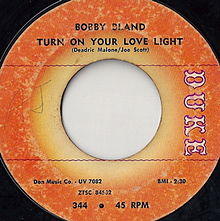We lost Bobby Bland in June. He was 83 years old at the time of his death, and he had one of the most distinguished careers in the annals of rhythm & blues. As I’ve often said in this column and elsewhere, the giants of the classic age, who we are losing on a regular basis now, cannot be replaced. We are, however, left with their music, and that is something to be thankful for.
Bland was born in a small town in Tennessee. His birth name was Robert Calvin Brooks, but his father left the family when Bland was a young boy, and he got the name Bland from his stepfather. He never went to school and was illiterate for his entire life. In 1947 Bland moved to Memphis with his mother. By then he was already singing with gospel groups, and he began hanging out on the city’s legendary Beale Street in the company of future stars like B.B. King, Johnny Ace, Junior Parker, and Rosco Gordon. Together they were known as the Beale Streeters.
Bland began his recording career in 1950, releasing unsuccessful singles of the Modern Records and Sun Records label. Eventually he signed to Duke. Before he could go too much further however his career was interrupted by a two year stint in the Army.
By 1954 Bland was back in Memphis, singing in the (by now famous) Johnny Ace revue, and he returned to Duke Records. The owner of Duke was a guy from Houston by the name of Don Robey. To say that Robey was a sketchy character is something of an understatement. Knowing that Bland couldn’t read, Robey got his signature on a contract that was a nearly total ripoff.
Bland’s first single was released by Duke in 1955. He began to tour as a part of Junior Parker’s revue, which was known as Blues Consolidated. Singing wasn’t all that Bland had to do however. He also served as Parker’s valet and driver, a job he also did at one time or another for B.B. King and Rosco Gordon as well. It was at this time that Bland began to develop the big band style rhythm & blues that became his signature sound.
“Farther On Up the Road”, released in 1957, was Bland’s first successful single, reaching #43 on the Billboard Hot 100. He followed it up with a series of hit R&B singles starting with “Little Boy Blue” in 1958, and continuing with tracks like “Cry, Cry, Cry,” “I Pity the Fool,” and “Turn On Your Love Light”.
“Turn On Your Love Light” was released in 1961 and scaled both the R&B and pop charts. It became one of Bland’s most identifiable songs, remaining on the R&B chart for 15 weeks and reaching all the way to #2. The song was written by Bland’s arranger Joe Scott, but Robey managed to get himself a writing credit too, albeit under the name Deadric Malone.
The song was covered a number of times, including a 1964 version by Van Morrison and Them, and 1966 versions by the Grateful Dead, and the Rascals who did it as part of a medley that appeared on their Collections album. A year later Jerry Lee Lewis had a minor hit with his version, and a year after the Human Beinz had a big hit with it in Japan. In 1972 “Turn On Your Love Light” was covered by Bob Seger, and Edgar Winter’s White Trash.
Bland followed “Turn On Your Love Light” with a hit version of T-Bone Walker’s “Call It Stormy Monday (But Tuesday Is Just as Bad), which he retitled “Stormy Monday Blues.” Then he had his last R&B #1 with “That’s the Way Love Is” in 1963. The hits didn’t end there however. “Ain’t Nothing You Can Do” made it into the pop Top 20 at a time when the Beatles were ruling the charts in 1964. In all Bland had 23 Top 10 hits on the R&B chart.
The ’70s brought more success for Bland. He released several critically acclaimed albums during the period, and had hits with songs like “Ain’t No Love in the Heart of the City,’ which was covered by the band Whitesnake, and sampled by Kanye West, and “I Wouldn’t Treat A Dog.” In the ’80s Bland recorded for the traditional southern soul label Malaco Records, and toured with B.B. King.
Bobby “Blue” Bland was inducted into the Rock and Roll Hall of Fame in 1992. His performing career continued until just before his death in June.






Comments